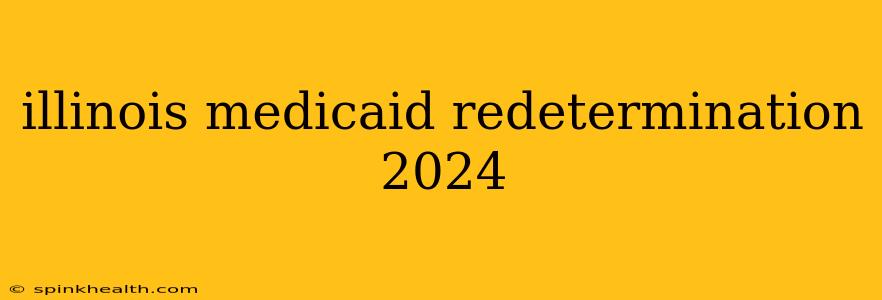The year 2024 marks a significant shift for Illinois Medicaid recipients. After a pandemic-era pause on redeterminations, the state is resuming the process of verifying eligibility for its Medicaid program. This means many individuals currently enrolled in Medicaid will need to take action to ensure their continued coverage. This process, while potentially daunting, is manageable with the right information and proactive approach. Let's unpack what you need to know about the Illinois Medicaid redetermination process in 2024.
What is Medicaid Redetermination?
Medicaid redetermination is the process by which state Medicaid agencies review the eligibility of current recipients to ensure they still meet the program's requirements. This isn't a new concept; it's a routine process designed to maintain the integrity of the program and ensure that those who need assistance receive it. However, the pandemic-related continuous coverage requirement brought a temporary halt to these checks. Now, the state is resuming these reviews, impacting thousands of Illinois residents.
What Does the 2024 Illinois Medicaid Redetermination Process Involve?
The Illinois Department of Healthcare and Family Services (HFS) will send notices to individuals whose Medicaid eligibility needs to be reviewed. These notices will contain crucial information about how to confirm your eligibility, including deadlines and the necessary documentation. Failing to respond to these notices could result in the loss of your Medicaid coverage. The process involves providing updated information about your income, household size, and other relevant factors that determine eligibility.
How Do I Know if I Need to Update My Information?
The most straightforward way to know if you need to update your information is by receiving official correspondence from the Illinois HFS. Be aware of potential scams and only respond to communications directly from the state agency. Don't hesitate to contact the HFS directly if you're unsure about the authenticity of a notice.
What Documents Will I Need for Illinois Medicaid Redetermination?
The specific documents you'll need will depend on your individual circumstances. However, common documents requested during redetermination include proof of income (pay stubs, tax returns), proof of identity (driver's license, birth certificate), and documentation related to household size (birth certificates for children, marriage certificates). The HFS notice will clearly outline the specific documents they require in your case.
What Happens If I Don't Respond to the Medicaid Redetermination Notice?
Failure to respond to the redetermination notice or submit the required documentation by the deadline could lead to the termination of your Medicaid benefits. This can have significant consequences, impacting access to vital healthcare services. It's crucial to act promptly and complete the process within the timeframe provided.
What if My Circumstances Have Changed Since My Last Application?
If your income, household size, or other relevant circumstances have changed since your last application, it is crucial to report these changes to the HFS immediately. This will ensure your continued eligibility and prevent any unnecessary delays or complications during the redetermination process. Proactive reporting can prevent potential disruptions in your healthcare access.
Where Can I Get Help with the Illinois Medicaid Redetermination Process?
The Illinois HFS offers various resources to assist you with the redetermination process. You can contact their customer service line, visit their website, or seek assistance from community-based organizations that provide support to Medicaid recipients. Don't hesitate to reach out for help; navigating the system can be challenging, and there are resources available to assist you.
The Illinois Medicaid redetermination process in 2024 is a significant undertaking. But by understanding the process, gathering necessary documentation, and acting promptly, you can ensure continued access to vital healthcare services. Remember, proactive engagement is key to a smooth and successful redetermination.

